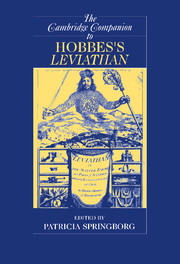Book contents
- Frontmatter
- General Introduction
- Part I: Of Man
- Part II: Of Commonwealth
- Part III: Of a Christian Commonwealth
- 10 Hobbes’s Covenant Theology and Its Political Implications
- 11 Omnipotence, Necessity and Sovereignty: Hobbes and the Absolute and Ordinary Powers of God and King
- 12 Hobbes on Salvation
- 13 Hobbes and the Cause of Religious Toleration
- Part IV: Of the Kingdom of Darkness
- Part V: Hobbes’s Reception
- Bibliography
- Index
- Series List
12 - Hobbes on Salvation
from Part III: - Of a Christian Commonwealth
Published online by Cambridge University Press: 28 November 2007
- Frontmatter
- General Introduction
- Part I: Of Man
- Part II: Of Commonwealth
- Part III: Of a Christian Commonwealth
- 10 Hobbes’s Covenant Theology and Its Political Implications
- 11 Omnipotence, Necessity and Sovereignty: Hobbes and the Absolute and Ordinary Powers of God and King
- 12 Hobbes on Salvation
- 13 Hobbes and the Cause of Religious Toleration
- Part IV: Of the Kingdom of Darkness
- Part V: Hobbes’s Reception
- Bibliography
- Index
- Series List
Summary
In England after 1640 the study of Christian theology and the Scriptures whose chief aim was the bringing of religion to bear on political issues exploded in an astonishing number of directions. The theological and political catalyst for this new departure was the bewilderment of those Christians for whom, after the Reformation, judging what was required for gaining access to the kingdom of God had become a private matter. Salvation became the key concept in a new strain in the polemical literature ensuing from the civil wars, especially among divinity students, and 'the tidings of salvation' became in England the focus of a mounting tide of words in print. Thomas Hobbes, the philosopher whom an influential strain of scholarship has charged of having instrumental views on religion, did his share in this common attempt to develop new ways of addressing the issue of salvation. 'Salvation' to Hobbes is not just an aspiration or right, or 'eternall deliverance', or 'inheritance', that people happen to have. Rather, Hobbes's 'Christian State' seems designed to accommodate people's desire to be saved and neutralize the politically destabilizing thrust of this desire.
- Type
- Chapter
- Information
- The Cambridge Companion to Hobbes's Leviathan , pp. 291 - 308Publisher: Cambridge University PressPrint publication year: 2007
- 3
- Cited by

